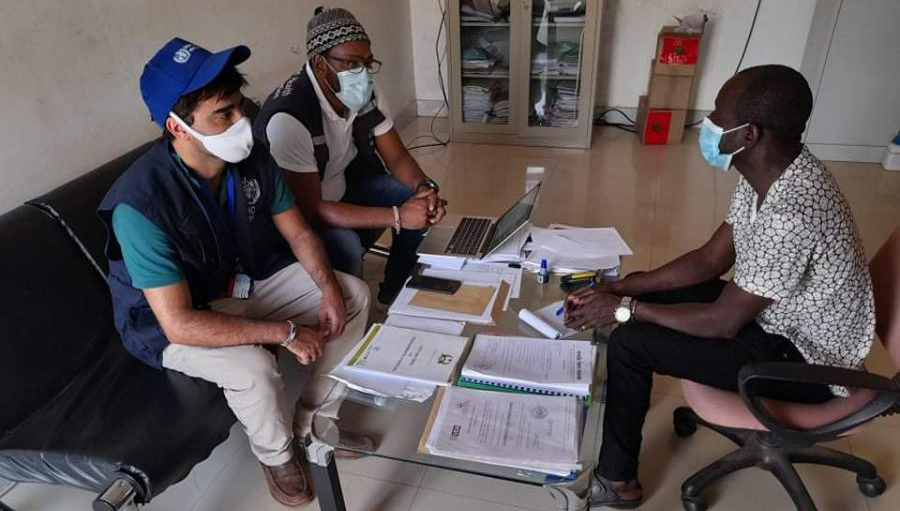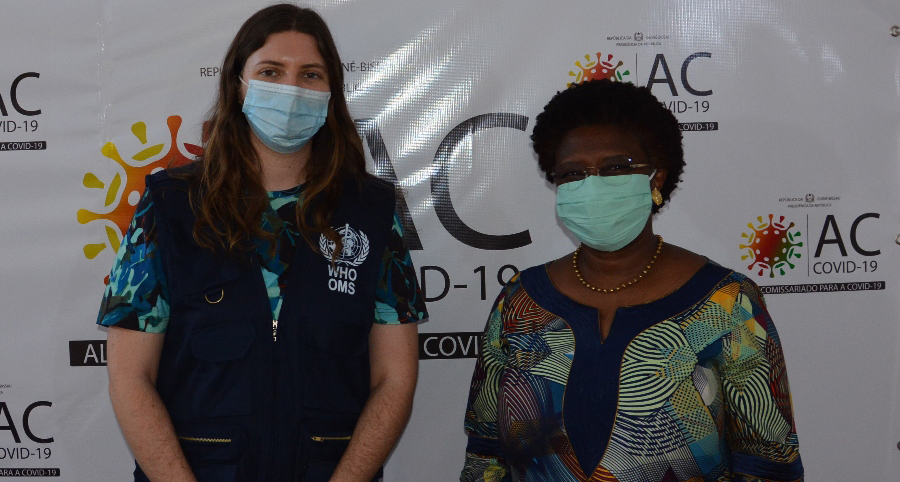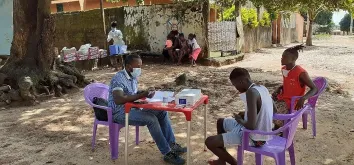In Guinea-Bissau, three UN Volunteers are working with the World Health Organization (WHO) to promote a healthier environment for vulnerable populations during the COVID-19 crisis. In the spirit of our partnership, we highlight their contributions in achieving the global goal of good health and wellbeing for everyone.
The UN Volunteers' fresh youth attitude, talent to navigate new technologies, and boldness for new ideas and innovation are highly appreciated. They all bring a genuine wish for change and a strong commitment to contributing to the achievement of SDG3: Good Health and Wellbeing. --Dr Jean-Marie Kipela, WHO representative in Guinea-Bissau
Since the outbreak of COVID-19, fake news has been a major challenge in Guinea-Bissau, like many other regions. In order to combat misinformation about the virus, Miguel Almeida, a UN Volunteer from Portugal, is assigned to the project "Strengthening the response capacity and mitigation of the COVID-19 pandemic" as a Health Promotion and Communication Officer.
As part of the WHO risk communication and community engagement team, Miguel provides accurate and scientific information through different channels, such as social media, radio and posters, on public health measures to counter rumors and misinformation.
Our objective is to convince leaders to view the fight against COVID-19 as a key priority and exercise their authority to inform the population on the protective measures. --Miguel Almeida, UN Volunteer Health Promotion and Communication Officer
He recently took part in a journey through five regions of Guinea-Bissau, along with the WHO risk communication expert, to sensitize communities. One of them is the remote village of Fajonquito, where people have no access to social media or the Internet.
In order to help the community, Miguel and the team delivered a communication session on individual and collective protective measures. This was attended by 40 participants, including religious leaders, national and regional authorities, women and youth associations leaders. "When we returned to the village the day after, the community was adopting protective measures. This made me feel proud," he recalls.

UN Volunteer Miguel Almeida (Portugal, left), UN Volunteer Health Promotion and Communication Officer, leading a risk communication session with local authorities of Cacheu, Bissau. ©UNV, 2021
Similarly, one of the main weaknesses of the health system in Guinea-Bissau is that it is hard to collect and manage reliable health information. This issue became more evident during the pandemic, revealing the challenges in using accurate data for planning and decision making.
Doniam Manuel Biague, a national UN Volunteer Information Management Officer, is playing a vital role in strengthening the capacity of health institutions. He supported creating a dedicated website for the High-Commission on COVID-19, where information on the epidemiological situation in the country is published every day, to coordinate the COVID response activities. He also assists in gathering and analyzing information related to capacity building and technical assistance missions conducted by WHO in-country to develop a comprehensive database. Doniam is among national UN Volunteers deployed through the UNV's Special Voluntary Fund.*
Volunteering is an opportunity for me to actively support my country amidst the pandemic. Through the WHO mission, I'm assisting health institutions in their efforts to improve the quality and reliability of data, as well as the health information system in Guinea- Bissau. --Doniam Manuel Biague, national UN Volunteer Information Management Officer
Yet, another major challenge that the COVID-19 pandemic has intensified is the issue of gender equality; the COVID-19 related strict prevention measures have had devastating impacts, especially on women –many have lost their jobs, have to carry a heavier domestic burden and suffer from gender-based violence, in the worst of cases. In order to tackle this, Tess Mitchell, a UN Youth Volunteer fully funded by Ireland, supports mainstreaming gender and youth with WHO.
As a Gender and Youth Associate Officer, Tess has visited and coordinated with different partners to identify strategies and synergies to address issues faced by women, but also children. She supports collecting data to analyze the socio-economic impact of COVID-19 in the health sector and WHO's contribution.
As a young person starting a career, taking part in the significant work of WHO in mitigating the impact of the pandemic is a rewarding experience. I hope to make a substantial contribution in improving women and youth wellbeing through my assignment and develop my technical skills. --Tess Mitchell, UN Youth Volunteer Gender and Youth Associate Officer
 UN Youth Volunteer Gender and Youth Associate Officer Tess Mitchell (Ireland, left) with the High Commissioner for the COVID-19 response in Guinea-Bissau, who she interviewed for International Women's Day. ©UNV, 2021
UN Youth Volunteer Gender and Youth Associate Officer Tess Mitchell (Ireland, left) with the High Commissioner for the COVID-19 response in Guinea-Bissau, who she interviewed for International Women's Day. ©UNV, 2021
Now more than ever, ensuring healthy lives is a key priority for achieving sustainable development. By learning more about the mandate and different pillars of WHO, as well as supporting numerous stakeholders that operate in the health sector in Guinea-Bissau, UN Volunteers are making instrumental changes for a healthier and better future.

